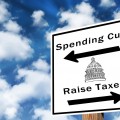 As America’s economy shows mixed signs of health, the country’s chief executive officers are beginning to show pessimism about the immediate future.
As America’s economy shows mixed signs of health, the country’s chief executive officers are beginning to show pessimism about the immediate future.
Fewer CEOs anticipate increases in sales, hiring or investment in the last half of the year than they did only a few short months ago, according to the Business Roundtable’s second quarter survey.
The survey was conducted even before the U.S. gross domestic product for the first quarter faced a downward revision to show a 0.7% loss over the previous year.
The Business Roundtable’s survey involves 128 corporate CEOs. It focuses in on sales, hiring and capital spending expectations for a six-month period.
The latest survey showed that 70% of CEOs anticipate sales to rise over the next six months, but that number is down from the 80% reflected in the first-quarter survey and is the lowest anticipation point recorded since 2012.
Capital spending projections are also down. Only about 35% of CEOs intend to increase spending in the next six months, which is down from 45%.
The potential for new hires is also down. The second quarter survey indicated that only 34% of CEOs intend to increase hiring activities, which is down from 40% only a few months before.
The downward spiral in outlook comes on the heels of a string of mixed reports about the county’s economic health. The contraction in the gross domestic product for the year is one sign that the economy isn’t as robust as desired.
Consumer spending has also been sluggish and the strength of the dollar has lagged. Even so, nonfarm payrolls have jumped and wage growth improvements indicate signs of health.
“Of particular concern is the downward movement of our CEOs’ investment plans,” Randall Stephenson, chairman of the Business Roundtable and AT&T’s CEO told the Wall Street Journal. “Business investment is a key driver of economic expansion and job growth.”
Stephenson would like to see Congress enact the Trade Promotion Authority bill that would give the White House the authority to negotiate trade agreements with other countries with final approval resting with Congress. This bill is seen by Stephenson as a way to bolster economic growth and job creation within the United States.
While the fate of the Trade Promotion Authority bill remains unclear due to lacking votes in the House, CEOs plans to corral their own spending to weather uncertain economic conditions.
Whether outlooks will improve over the coming months remains to be seen. As it stand, the Business Roundtable CEO Economic Outlook Index rested at 81.3 in the second quarter, down from 90.8 in the first.
Despite the drop, the current index rating is well in range with the long-term index average of 80.5.





